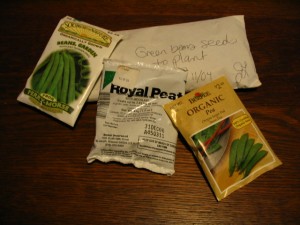Ah, January in Michigan! During this month, we experience winter at its finest. Cold, snow, ice, rain, fog– we see it all. January is also the gardening season when seed catalogs and seed displays pop up as fast as weeds in the springtime. One week the store aisles are full of holiday clearance, and the next week towers full of little packets promising all sorts of garden wonders appear to inspire and tempt us.
My first spin around the rotating floor display stand showed that there were even more variations on packing and labels this year. Even the big labels are offering more in categories like heirloom and organics. There’s truly something for everyone.
What do the terms mean when we are discussing seeds? Here’s a review of some definitions to consider when making seed purchases.
Annual— an annual lives or grows for only one season. Annual flowers give one season of color to a garden. Most vegetables are annuals too, growing and being harvested in one season. Some annual plants will reseed themselves; with other annuals, seed saving is a possibility. For most annuals, count on one season.
Perennial— are plants that live at least two seasons. Perennials grow and bloom over the spring and summer, and die back in the fall or winter. In the spring, they return again from their root stock rather than from reseeding. Fruit trees are perennials, as are asparagus and rhubarb. Plants may be perennial in some regions but not others, due to varying weather conditions.
Organic seed — To label seed as organic in the US, suppliers must meet standards set by the government. The growers of organic seeds have to avoid synthetic pesticides and fertilizers. They must also avoid the use of genetic modification techniques.
Hybrid — A hybrid is a variety that results from crossing two different inbred parents that differ in one or more characteristics. Hybrids are made to improve the characteristics of the resulting plants, such as higher yield, better color, greater uniformity, or disease resistance to name a few. Seeds of hybrid plants, if saved and planted, would not necessary result in plants resembling the parent.
Non-GMO — Seeds that have not been genetically modified.
Heirloom — Heirloom varieties can be defined as variety that has been nurtured, selected, and handed down for many generations. These varieties are known for their flavors, rather than uniformity or ease of shipping. Some sources say the variety must be 100 years old, some claim 50, and others use 1945, the end of WWII, as the starting point. The definition of this word is also debated.
Open-Pollinated — These seeds are created by self-pollination or by the repeated crossing to the same parental type. The seed of the fruits produced by open-pollinated plants can be saved and planted the next year, with the resulting plants being true to the parental type. (With the exception of plants in the cucurbit family, I would add.)
I’ve previously mentioned two of our favorite seed companies, Baker Seeds and Seeds of Change. Both companies focus on offering heirloom varieties that are open-pollinated and non-GMO seeds.
If you are planning your garden right now, what companies do you rely on for seeds? How important are terms like organic, heirloom or open-pollinated when it comes to making seed purchases?



